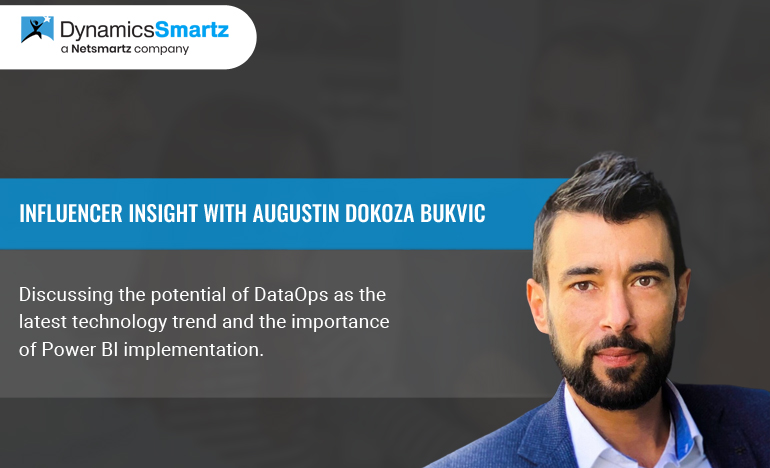Microsoft Dynamics Influencer Insights
Director Analytics CoE, Augustin Dokoza Bukvic, Take on Latest Microsoft Technologies and Power Platform
With the advent of technology, we're pacing towards better computing systems day by day. Microsoft technology has witnessed a significant shift from on-premise systems to cloud-based software. With the increasing demand for flexible and cost-effective solutions, more and more organizations are turning to the cloud to meet their computing needs.
In our Influencer Insights segment, we have a discussion with industry leaders to get hands-on knowledge about the latest technology trends.
To learn more about the importance of governance while implementing Power BI, we had a conversation with the Microsoft Certified Trainer, Augustin Dokoza Bukvic.

Who did we interview?
Augustin Dokoza Bukvic is an Analytics Architect, Microsoft Certified Trainer, Speaker, Power Platform User Group Stuttgart founder, and leader. He is a Director Analytics CoE at a next-generation consumer goods company. He is also a Solution Architect, focusing mainly on the Power BI platform and Data Governance.
He has been working with Power BI since the public preview version and has delivered multiple large-scale enterprise analytics projects for Fortune 500 companies. Furthermore, he is passionate about data culture and governance.
Let Us Quickly Get To Our Expert’s Point Of View.
Question 1- What, according to you, are some of the top Microsoft technology trends to watch out for in 2023?
As my main focus is data analytics, I would say the trend to watch going forward is DataOps. DataOps is a lifecycle approach to data analytics using agile practices, orchestration tools, and infrastructure to deliver high-quality data with improved security quickly. DataOps uses technology to automate the design, deployment, and management of data delivery with appropriate levels of governance. It uses metadata to improve the usability and value of data in a dynamic environment.
From the perspective of Power BI, what I am looking forward to this year is an enormous roadmap around modernizing the visualization part of the product. With a monthly update cadence, I am confident there will be a lot of fantastic improvements which will secure Power BI's leading position in the market.
Question 2: What are some opportunities you would be looking at this year?
The main opportunities will arise in the orchestration and integration area of our data landscapes. Last few years, we have witnessed significant adoption of Azre, and we moved away from the big data paradigm, but with all those investments over the years, we need to find a way to put the pieces together. Putting puzzles together and unlocking the full potential of our data by integrating it into every business process and every functional area.
Today we have data can collect all the data we need, we can enrich our data models with ML and AI algorithms, and can derive insights from our data in nice and appealing visuals. The next step will be to unlock the full potential of data-driven operations by incorporating our insights into day-to-day tools and automating all hunch-based processes and decisions.
Question 3: Would you like to share some tips on Power BI implementation?
If your organization is planning to implement Power BI as a reporting platform or if you are still in the early stages of implementation, try to avoid repeating a mistake many others are making and include governance in your implementation process from day one. Governance might be something that is not delivering recognizable value to the end user in the beginning, but leaving it out will cause a lot of potential challenges in the future.
The main focus of data Governance is not on the data itself but instead on governing what users do with the data. With a proper set of data, and governance practices, users with empowered to be more productive and efficient, the company will comply with regulatory standards, and internal security requirements will be met. With well-established guardrails, organizational data culture and adoption can and will become a smooth process built to empower all participants.
Question 4: What is the potential for Microsoft Partners in Germany?
The German market has enormous potential; historically, it has been cautious about changing new technologies, with big companies as late adopters. But that means only a lot of open topics are still around digitization, modern data stack, and advanced analytics. With many small and medium companies ready to dive deep into the data-driven world, partners should power them with support and knowledge to keep their competitive edge in these challenging times.
Question 5: How can we leverage Microsoft 365 and Power Apps for improved collaboration?
If I am looking at the entire Power Platform, I see a significant improvement in potential collaboration potentials throughout companies. With close integration of Teams and Power BI, we can bring the data-driven decision-making process to our meetings. With further possible integration of Power Apps and Power Automate, we can directly trigger workflows and processes based on data-driven decisions from our meeting. That level of integration can significantly increase our efficiency and reduce the number of meetings needed.
And that was just my top-of-the-mind idea; the potential is enormous, and the entire suite of low code no code tools empowers everyone to come up with new ideas and implement them rapidly.
Get to Know Our Influencer
What is the best event that you attended recently? What were your key takeaways?
Last year I was at more than in-person events. The one I keep in a pleasant memory is Data Festival in Munich because it was vendor agnostic and entirely focused on real-life projects, experiences, and challenges companies face. With diverse speaker backgrounds and industries, it was fascinating to hear that we all share similar data challenges. We tackled those challenges by networking with peers and exchanging ideas.
What's your success mantra?
Never stop learning; no excuse. Learning in a fast-paced technology environment is the only constant. With new tools and technologies emerging all the time, we need to keep our learning pace high; no matter if it is existing skills improvements or adopting a completely new skill, it will keep us relevant on the market. We need to adopt constant learning on a company and a personal level and put it as one of our ongoing KPIs.









